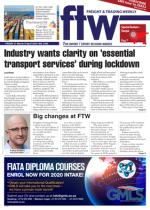Cost escalations will be inevitable when the United Kingdom finally leaves the European Union, experts have warned. With the final trade deal still to be negotiated, traders have been advised to start preparing now for the change – and it’s the export of goods to the UK that is likely to have the most far-reaching consequences.
Customs requirements and declaration processes are expected to increase significantly. Tigers Global Logistics South Africa regional director freight forwarding Europe, Sharon Page, told FTW the IT capability of logistics companies would be a key component, particularly in the post-Brexit environment where it has historically been easy to fulfil cargo to the UK from the EU and vice versa.
“There will be more customs requirements and more processes. Having cargo located close to the end user will save transport costs on the final mile delivery.” It is commonly accepted that Brexit will generate additional costs – especially for cargo movements between the UK and Europe. Once Britain leaves the EU, full customs declarations will be required for all imports and exports to the UK as it will then be classed as a “third country” outside the single market. It will not matter what customs union is in place or even whether there is a free-trade agreement.
“The UK leaving Europe will create many changes for customers,” said Page. “ We have already seen customers move locations from the UK into Europe or vice versa and we have seen changes in how cargo has been moved, with customers choosing even before the agreed exit date to separate cargo at origin into what is destined for the UK and what is destined for EU.”
This, she said, was already having an impact on the landed cost of goods as freight rates and local charges were not the same in the UK as they were in Europe. “For many years trucks have moved freely in and out of Europe and as a result a customer has chosen to locate their cargo in one or the other place or import their cargo into one or another place. From 2021, customers will be required to do customs declarations to move cargo between the UK and Europe.”
She said most shippers and transporters were not used to this and with no further extensions expected after 2021 companies were advised to prepare for the changes now. This included getting infrastructure in place.
“There are already concerns around long queues to authenticate T1 documents, creating delays - and working with an agent that has authorised consignor status will ensure much quicker movement,” she said. According to Professor Gerhard Erasmus of the Trade Law Centre (tralac), the impact of Brexit on cargo out of South Africa – particularly to the UK – was still unknown.
“There are questions about how it will impact cargo,” he said. “Will cargo destined for the UK entering via European ports now have to be moved in bond to the UK or not? The final agreement between the UK and EU is of extreme importance to us as it will affect how we move cargo from here.”
Considering the high inland haulage costs in the UK, many South African shippers more often than not opt for the European route when exporting to remote regions in the UK rather than exporting direct. “For ports like Southampton, Immingham or Hull, or for that matter anywhere in Scotland or Northern Ireland, the European route is often the better option.

